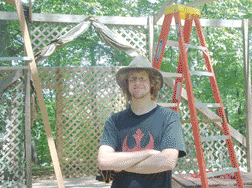Working Their Way Up
How the next generation steps into the world of work
by Bethany Rodgers, Bay Weekly Intern
This time four years ago, I’d be bent over a paper-covered table, sorting frozen moths from mosquitoes with a pair of tweezers. Insects are not my friends, nor do I plan to make them my career. I would only do this for money. My price was $10 an hour, and the Maryland Department of Agriculture, Mosquito Control Section, was willing to pay it.
It wasn’t a bad salary for an unskilled 18-year-old saving up for her freshman year in college. But I had a hard time justifying myself to my friends on those grounds. My nickname for a certain dark period was mosquito.
To afford college, I was willing to soil my reputation. Going to work makes you decide what you’re willing to sacrifice. Summer jobs are practice rounds where high school and college kids figure out what kind of employees we are. I’ve moved on to more mainstream jobs, as a barista at Starbucks and a Bay Weekly intern, but I’m still doing the same balancing act I practiced at Mosquito Control, asking myself what I’ll do to make a buck and whether making money is the point.
Even if we mess up, it’s at least with the liberating knowledge that these summer jobs are only temporary.

Feeling Good
At 15, Mylah Howard already has a clear idea of what she’ll compromise on. “I do not want to have to clean up after people. It makes me feel inferior,” said Howard, of Bowie. So working as a waitress at a pizza parlor where she had to bus her own tables was not the right fit for Howard. This summer, she works for Café Décor, an arts and crafts shop in Crofton.
The shop and the one next to it, The Bead Shack, are owned by a family named Meyers. Summer camp groups visit the stores to do projects, such as beading necklaces. Howard helps run these craft days.
On the job, Howard dons a blue apron to ward against glue as she helps dozens of children from a nearby karate camp affix beads to wooden pineapple cutouts. They’re making SpongeBob picture frames and making Café Décor a frenzy of creativity, paint and seashells.
Howard, who wants to be an interior designer, loves the frenetic atmosphere of her workplace. She gets along with the Meyer siblings, who started the two stores as kids and are now about Howard’s age. She likes her job for another reason. Many of her peers have to deal with being underestimated, but not her. She doesn’t feel looked down on in this young crowd. She experienced condescension as a waitress. “Some people are so mean and nasty. I usually pay it no mind, but inside, I’m like, That’s not right.”
I felt the same way working my first job at a concessions stand at University of Maryland sports events. I had to stand on a crate to reach the high registers, but my youth didn’t save me from irate customers. In fact, my age seemed to annoy them. It was like they felt a strange freedom to air their frustration any way they chose because, to them, I was the incompetent face of the concessions stand instead of a scared kid.
The feel of the workplace is a priority to Eric Smith, 21, who works as a junior ranger ambassador for Valley Forge National Historical Park. “It’s actually really relaxed,” said Smith of his Pennsylvania workplace.
Before he goes back to Haverford College for his senior year as an English major, his assignment is to write a book kids can fill out for their junior ranger badge. Smith, of Fairhaven, spends his day walking around the park for inspiration, or staring at the computer, waiting for ideas to hit him.
It’s the right job for an aspiring poet, or at least Smith’s friends seem to think so. “When people hear where I work, they crack up and say, That’s so perfect,” says Smith, a former Bay Weekly junior reporter. He supposes this is because his job doesn’t seem like the type where he would be stuck behind a desk, even though he often is.
He thinks it’s pretty random that he works at the park, but he suspects he gravitated toward it because he likes the outdoors and because it seems worthwhile.
“I can convince myself the National Park Service is something of a good cause,” he said. He also enjoys it that the Park Service provides him with free housing, where he lives with other college students. The only factor that doesn’t motivate him to work there is the money, because he doesn’t get paid much. “It’s more for the experience,” he said.
I admire this attitude, but I can’t say it’s been the story of my life. Money has always been a concern for me, as it is for Davidsonville resident Michael Leidner. In his mind, why else would you work? He’s saving his handsome salary to buy a house, and he just got a shiny new Honda Prelude.
Earning Big
Leidner, 19, interned for over a year for ARINC, Aeronautical Radio Incorporated, an Annapolis company that works with commercial aviation communication.
In June, Leidner got a full-time job at the company and plans to take night classes at Anne Arundel Community College to continue his degree in information systems. Now that he has a regular income providing hardware and software support, he’s got his future well set up.
degree in information systems. Now that he has a regular income providing hardware and software support, he’s got his future well set up.
While steady work might freak out many commitment-wary 19-year-olds, it’s fine with Leidner; he’s loved computers since he was around 13, when he began “tinkering” with them. His dream was to create a heavily trafficked website for kids, complete with games, cartoons and music. The only hits Leidner got were from his own visits to his site, though, and his dream fizzled.
Still, he has an intuition with computers, which is one reason he’s glad he works at ARINC. A large part of Leidner’s internship involved tinkering with computers in ARINC’s basement. “It was like a mad scientist’s lab,” he said.
Understanding customers doesn’t come as easy to Leidner as understanding hard drives, and he said he would never work in food service. “I can make better money sitting in my nice, air-conditioned cube and not having to deal with customers,” Leidner said. “This job matches my personality because I’m not super social. Talking with people is important, but it’s not the main component of the job.”
Loving Work
While Leidner has his career squared away, Mark Celeste isn’t even working for money. He’s spending his summer directing a production of The Tempest with the Chesapeake Theater Company — for free.
Celeste, 19, is aware that his parents’ generosity allows him to give his time pro bono, but he is sacrificing, too, giving up some extra cash for the sake of experience.
“I would rather focus on something I can put passion and energy behind, even if I’m not financially benefiting from it,” said Celeste, of Huntingtown. So he uses his energy to decide where Prospero should stand and how Ariel should be suspended above the stage.
Unlike Leidner, Celeste thrives from interacting with people on the job. His favorite moments as a director are collaborative, as when he helps his actors bring a character to life. He gave one actor brief instructions on how Caliban should move, then watched as the actor transformed into a hunched and limping monster. “I was never so happy as to see my friend drag himself across the floor,” Celeste said.
Celeste’s not eager to settle into a paid position now, but he feels confident he will find a job that suits him one day, even though he has no idea what it might be.
“I think I’ll be able to find a job I truly enjoy one day, one where I can make a lot of creative decisions,” he said.
Being a director and watching a play go from the page to the stage must be a rush. Some jobs have zing built into them, while others are so boring you’d need to skydive to unwind. In those jobs, time can pass at a snail’s pace, and four o’clock can seem as remote as the money in your next paycheck. My plan to stay sane in the long hours at the Mosquito Control was dividing the day into two-hour units I could cope with. At 10am, I allowed myself to get a Coke. At noon, I’d take my lunch break. At 2pm, I left the lab to set up my mosquito traps.
Passing Time
Erik Embry, 18, who works at the Prince Frederick Library, has to find ways to pass the time. His main job is to reshelve, and he is ever amused by the kinds of books people check out.
“Sometimes, people borrow a book, like how to cook some obscure fish, and I’m like, Why do they have a book for this?” he said. People-watching is one pastime he shares with retail workers everywhere. I would know; I’ve done that too.
Embry likes the calm atmosphere of the library, but he doesn’t want to push book carts forever. When he goes to the University of Florida next fall, he plans to major in English, philosophy or international policy. He hopes to enter a career where he can travel the world will be and his time-wasting tactics unnecessary.
“I would like to have excitement with my job,” he said, “and this is a little bit of an exception.”
Planning Ahead
Kimberly Johnson, 22, has a job that mixes the extraordinary and the mundane. She’s a lifeguard at the Arundel Olympic Swim Center in Annapolis. Many days, work is a matter of sitting in the high chair and making sure no one runs instead of walks. Johnson can’t let herself feel complacent, though. In the six years she has been life-guarding, she’s saved six people from drowning.
Jobs often help us figure things out about ourselves, and Johnson has discovered that she’s good at dealing with extreme situations. “I get an adrenaline rush,” she said.
Johnson says it’s good to know that she has saved a life. But like many of her peers, her main reason for working is pay. “I’m making more money to take the necessary steps to become an attorney,” she explained, adding that after she graduates from University of Maryland, Baltimore County, with a psychology degree, she hopes to head to law school.
Another way Johnson’s personality shows up in the workplace is in how she interacts with her bosses. She sees many people her age struggle with whether to treat a boss with familiarity or formality. But she likes to keep the roles of friend and boss separate. “The relationships need to be black and white,” she said. “[Bosses] are my authority figures; Buddy-buddy, not so much.”
Mark Celeste, the director, is the opposite. He likes forming friendships with his bosses. “I think when you have a bond with your bosses, you’re more comfortable putting out your own ideas and pointing things out,” he said.
My view of bosses is more similar to Johnson’s than Celeste’s, but it’s gotten me into a little trouble, because leaders want friends, too. I suspect one reason I never got promoted at my retail jobs was that I never tried to befriend my bosses. I’m not sure how this translates in the professional world, but my feeling is that these relationships are even more complex. Workers have to know without being told when the bosses want to play and when they want to work. And when they want to do a little of both.
Meeting Challenges
Laura Bailey, 19, agrees. At Calvert County Department of Economic Development, where she works as an intern this summer, she waited on her boss to set the tone. “It depends on how they present themselves to you,” she said. “But I have to always remember that’s where my paychecks are coming from.”
Bailey works at the Economic Development because the job pays well, but she also likes the challenge. One summer, she worked for a caterer, and another time she worked for a packaging company. She calls her current job — data entry and organizing events — the best she’s ever had, and likes it better because she does projects alone.
Bailey had never worked independently before, and it was difficult for her to pick up. At my other jobs,” she said, “there were always people telling me what to do next. So when I got to this job, I was confused.”
Once she caught on, she was hooked. The Calvert County photo contest, which has just announced its winners, was her responsibility and she is proud of it.
A sophomore information systems major at Brigham Young University, Bailey believes this job has helped her realize that she needs to be challenged by her occupation. “If you’re not moving forward [at a job], then you should quit,” she said.

Settling In
Rachel Presa, 27, said she doesn’t like to fall into routine, either. When she graduated from Goucher College with a degree in English, she didn’t know where to go from there. She tried journalism — she’s a former Bay Weekly intern — and teaching. But in the end, she wanted more experience of the world. For the next four years, her moves were dictated by place rather than work.
This summer, she’s working as a waitress at Westlawn Inn in North Beach. In the fall, she’ll finally settle down. She’s heading off to New York University to study law and begin her career.
For Presa, there is no shame in being a server. “You’re getting paid for your competence,” she said.
Presa advises young people to explore and keep their options open. Only after traveling the world and trying her hand at several different occupations is Presa ready to set her course. “My hope is to be in a job that is rewarding and where I make enough money so that I can do things other than work,” she said.
I’ve had a lot of summer jobs, some weird and some normal. Through them all, I’ve gotten to know myself better. I’ve learned that I should never work with breakable things after I dropped a few Frappuccino drinks and pastry trays at Starbucks. I discovered I’m sort of a workaholic. I need to make sure I sleep and hang out with people, even if it means being less successful.
Summer jobs have also taught me a few things about the world. I could pick an Asian tiger mosquito from a pile of insects, then tell you whether it’s a male or a female. Strange as it sounds, I kind of like that.
